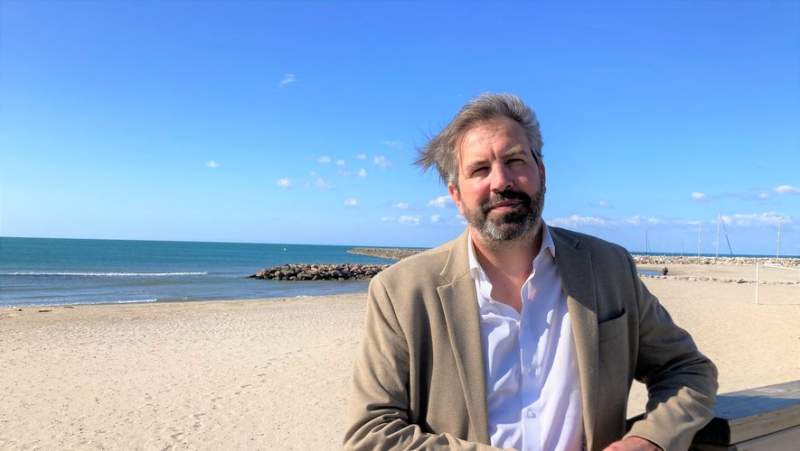“A lido, basically, it is not inhabited”, Loïc Linares launches, with the Agglo de Sète, public meetings to take stock of the coastline

Loïc Linares est vice-président de l'agglo de Sète chargé du développement durable et de l'aménagement du territoire. MIDI LIBRE – PHILIPPE MALRIC
L’Agglo de Sète organise quatre réunions publiques pour faire le point sur le trait de côte et son évolution.
On Monday, June 3, the first public meeting on the evolution of the coastline will take place in Sète. Since you are the vice-president in charge of ecological transition and regional planning, what can you say about it??
Above all, this meeting is part of the four axes of the development partnership project. It firstly involves a contribution from State services, i.e. 800,000 euros; for studies. Secondly, as Sète and Frontignan are part of the decree listing coastal erosion, we must plan on the evolution of the coastline in 2100. Thirdly, there are pre-operational studies on the viewshed to see how we can protect property and people. Finally, fourthly, we must involve the inhabitants of the territory in all these reflections. So these four public meetings are intended to update information.
For what purpose?
The point is not to panic the world. It’s an awareness of the evolution of the lido. It is heavily attacked by the sea even though man is largely responsible for climate change. In the 20th century we believed that we could control everything, but now we have to adapt. We are living beings in the living. We are therefore going to popularize all the technical and scientific elements so that everyone is at the same level of information. It is then up to us to put in place adaptation scenarios over time. And to find how we can integrate the State which tells us that we must do differently but whose rules do not allow it. We started on a three-year schedule with regular meetings with residents. At Toussaint, for a new session, there will be more thematic workshops.
What lines of thought could then be proposed ?
Since Sète and Frontignan are on the decree list, we can deviate from the coastal law. But you need to know on what points… We can also think about particular sectors. For example, the lido of Frontignan is deteriorating much more quickly than that of Sète while that of Marseillan is little affected. This is why, even if we are not obliged to do so, we have included the Thau pond as well as those of Vic and Mireval into our thinking.
Four meetings scheduled in the territory
program The Development Partnership Project (PPA) spatial recomposition, is the result of a call for expressions of interest launched in 2023 by the State and whose ;rsquo;Agglopôle was the winner. To date, five territories are in such an approach, only one on the Mediterranean coast. The general ambition is to define a land use planning strategy which anticipates climate change, zero net artificialization and the decline of the coastline on the horizon of the end of the century.
The public meetings are planned for Monday June 3, 6:30 p.m., Tarbouriech room (Théâtre de la Mer) in Sète, then Tuesday June 4 at the Piano Tiroir in Balaruc-les-Bains (6:30 p.m.), Tuesday June 11 at the Maison du temps libre de Mèze (6:30 p.m.) and same time for that of Thursday June 13 at the Aire de Frontignan room.
As the project asks us to think about the situation in 2050 and then in 2100, the studies that will be carried out will help us determine the evolution of the territory over time. And what tools to use ? Should we pre-empt as soon as a house is for sale on the lido of Frontignan ? Should we reopen graux in the lidos ? This is the type of question we are going to ask ourselves.
In any case, ultimately, decisions will have to be made…
We unbalanced things. And fortunately, somehow, that the Racine Mission was not interested in our sector. It would be even more catastrophic today. A lido, basically, is not inhabited. Since the development of the Rhône, we have been in a sediment deficit. This combined with the rise in water levels. Result: our coastline will be increasingly attacked over time.
It is certain that we will have to find a point of balance to be able to protect the inhabitants while making them leave their property which has great emotional and/or financial value. We will have to readjust the housing policy that we have been pursuing for 50 years. Change your lifestyle. It’s almost a sociological approach on how to continue to live on our coasts in relation to a changing environment. But by thinking now, we are in control and we can remain masters of our destiny. This will not be decided for us.
I subscribe to read more




